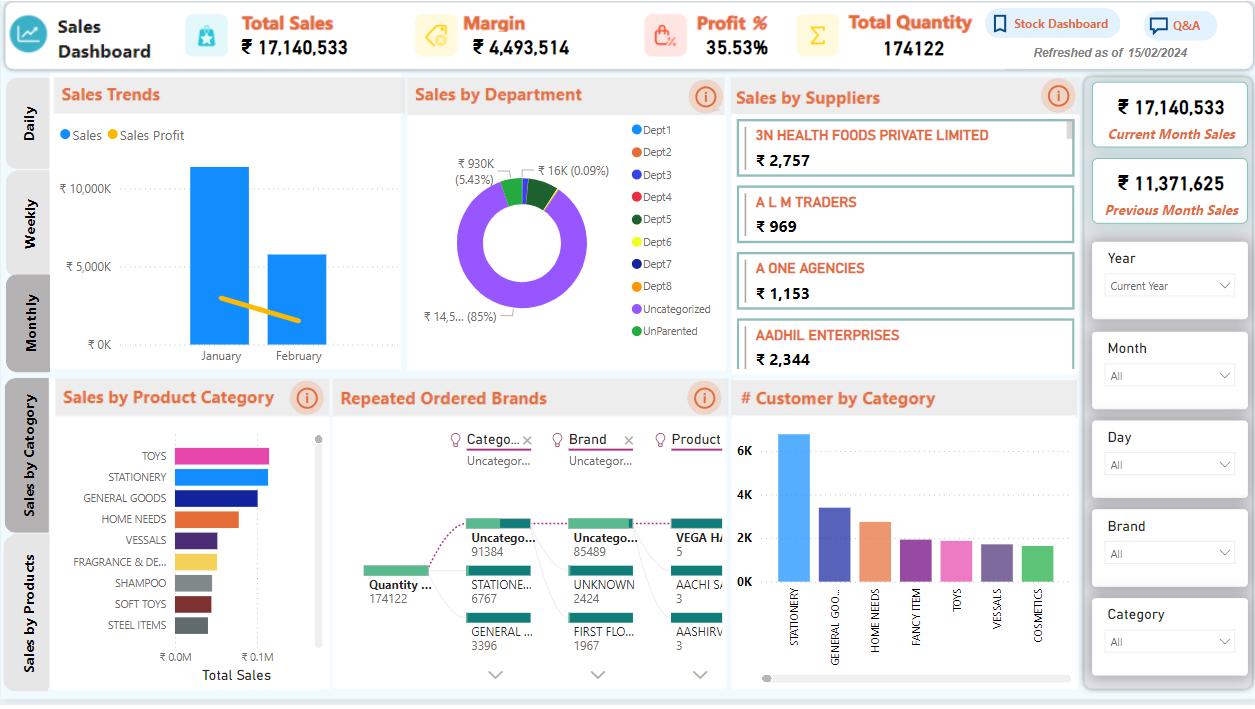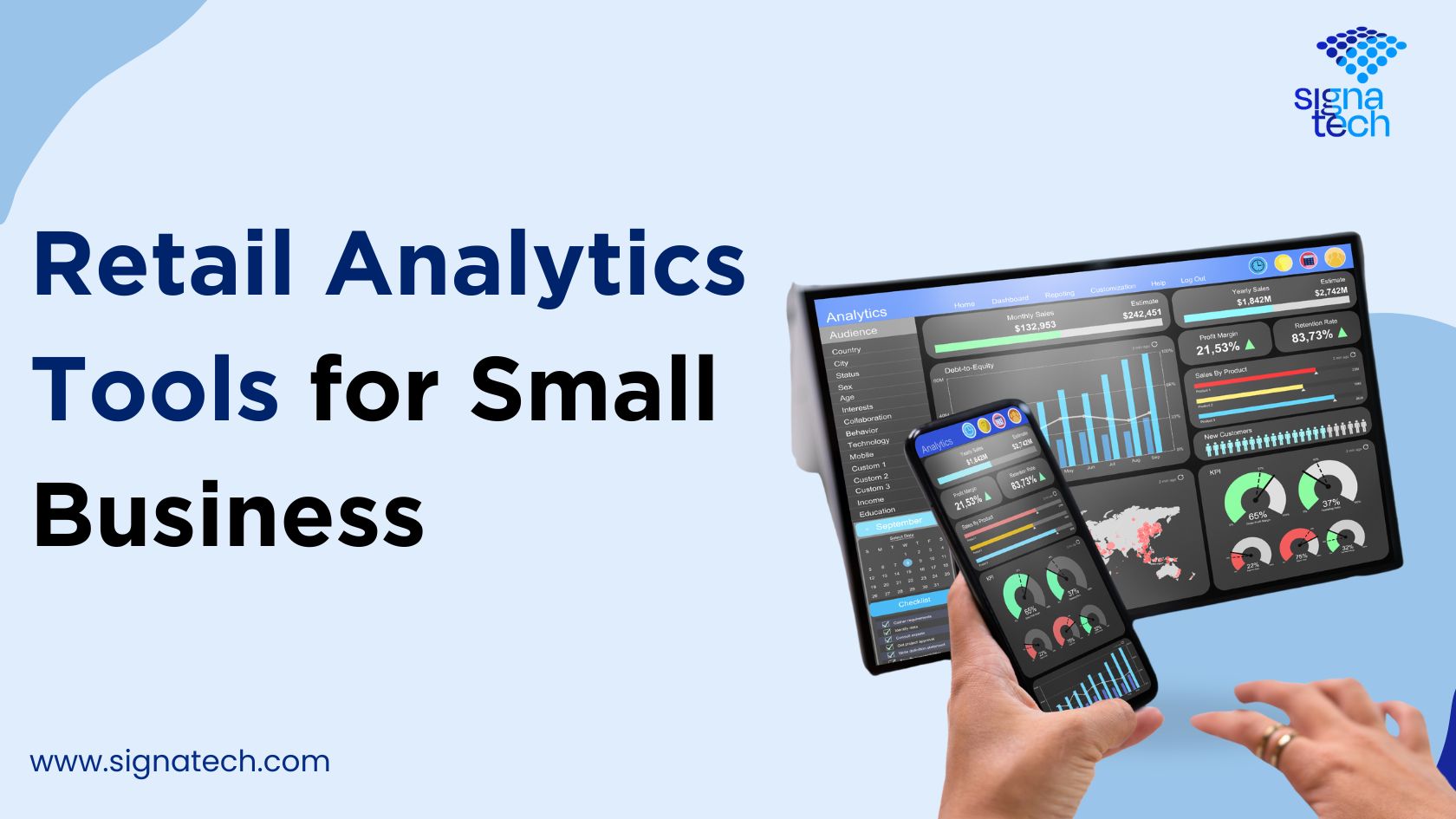For small businesses getting to get ahead in a highly competitive market, retail analytics tools are the secret weapon that can make all the difference. These tools help you understand customer preferences, predict market trends, and make informed decisions that drive business growth.
This guide simplifies the complex world of data analytics and introduces some of the best retail analytics tools available. These tools will help you collect and transform data into actionable insights, propelling your business forward.
So, make way for the right analytics tools in your organization, which empower your organization and make the decision-making process easy, operations streamlined, and reaching new high levels easy.
Top Retail Data Analytics Tools for Small Businesses
Choosing the right retail data analytics tools can significantly impact your business. Here are detailed insights into some top selections:
1. Signa Insights

More than generic retail analytics tools might be required for businesses with specific analytics needs. That’s where Signa Insight comes in, with bespoke dashboard solutions for your business needs. We eschew generic data analysis to dive deep into your business intricacies and offer insights into direct application and immediate benefit. This is the promise of Signa Insight: an idea that builds a solution through an understanding of your unique challenges and goals, which will act as a catalyst for growth, that your analytics concur with business aspirations. With Signa Insight, your business is not just equipped with data; it’s empowered to lead with intelligence.
- Deep Customization: Tailored dashboards and reports to meet specific business needs.
- Seamless Integration: Easily integrates with existing systems for comprehensive data analysis.
- Scalability: Grows with your business, handling increased data volumes efficiently.
- Actionable Insights: Provides clear, actionable insights to drive business decisions.
- Comprehensive Support: Offers extensive support and training to ensure effective tool utilization.
2. SAS Retail Analytics
SAS Retail Analytics offers a suite of solutions designed specifically for retail. It provides customer insights, demand forecasting, inventory optimization, and promotion effectiveness. This tool is best for large retail chains and businesses requiring deep, advanced analytics.
- Customer Insights: Detailed understanding of customer behavior and preferences.
- Demand Forecasting: Accurate predictions of future product demand.
- Inventory Optimization: Efficient management of inventory levels to prevent overstocking or stockouts.
- Promotion Effectiveness: Analysis of promotional campaigns to maximize ROI.
3. IBM Watson Analytics
IBM Watson Analytics is an AI-powered analytics platform from IBM. It features natural language processing, predictive analytics, data visualization, and automated insights. This tool is ideal for retailers seeking AI-driven analytics and predictive insights.
- Natural Language Processing: Easy data querying using natural language.
- Predictive Analytics: Forecast future trends and outcomes.
- Data Visualization: Clear, interactive visualizations of data.
- Automated Insights: AI-driven insights for quicker decision-making.
4. Tableau
Tableau is a leading data visualization tool that helps transform data into actionable insights. It offers interactive dashboards, advanced analytics, data blending, and collaboration, all in a mobile-friendly format. Tableau is best for retailers needing advanced data visualization and comprehensive analysis.
- Interactive Dashboards: Dynamic dashboards for real-time data analysis.
- Advanced Analytics: In-depth analysis capabilities.
- Data Blending: Combines data from multiple sources for holistic insights.
- Collaboration: Enables team collaboration on data projects.
5. RetailNext
RetailNext is an advanced in-store analytics tool. It provides customer traffic counting, behavior analysis, sales performance, conversion rates, and visual merchandising insights. This tool is best for brick-and-mortar stores looking to optimize in-store experiences and performance.
- Customer Traffic Counting: Tracks customer footfall in stores.
- Behavior Analysis: Understands in-store customer behavior.
- Sales Performance: Measures and analyzes sales performance.
- Conversion Rates: Calculates conversion rates for better sales strategies.
- Visual Merchandising Insights: Optimizes store layouts and displays.
The Importance of Retail Data Analytics for Small Business Growth
Imagine a world where your business decisions are not just guesses but informed choices backed by data. Retail analytics tools turn this possibility into reality, offering an all-round, full view of the business landscape.
For the small business, it’s a multi-benefit advantage: first, it’s about the insight into customers and understanding what they buy, when to buy, and why. This intelligence allows for tailored marketing that bets on enhancing customer experiences to elicit loyalty, ultimately.
That leaves inventory management: precise prediction of what will be in demand leaves you never overstocked or under-stocked but always right. This makes sales forecasting less of a guessing game and allows it to be truly a science toward better financial planning and risk management.
Retail analytics isn’t a tool to keep afloat in the competition but a way to show up so that your business is always an edge ahead.
Features to Look for in Retail Data Analytics Tools
Selecting the right retail data analytics tool is synonymous with getting a business partner; it should be a perfect fit. Here are the basic features:
- User-friendly: The tool must be friendly, such as allowing data analysis to be simple for one who doesn’t have a background in technology. It may be counterproductive due to its steep learning curve.
- Seamless Integration: A solution a company may already have that can integrate with the software for sales, inventory, or customer management. The process must enable seamless data transfer between platforms to minimize manual efforts and optimize efficiency.
- Customization and Flexibility: Every business and its needs and challenges are different. This means that a flexible tool provides customization that allows one to tailor dashboards and reports to only the metrics of their business that are important to them.
- Scalability: It is natural that, with the growth of the business, the volumes of data that require analysis would also increase. A scalable tool could handle the higher volume and increased complexity of data without the performance failing.
- Budget Constraints: The fact remains that small businesses have budgets in mind. Therefore, a very critical solution is affordable to the company’s limits.
- Support and Training: With adequate support and training resources, you will use all technical hiccups encountered in the tool’s operation.
Maximizing Your Investment in Retail Analytics
To truly benefit from your chosen retail analytics tools, consider the following strategies:
- Comprehensive Training: Training your team to use the analytics tool effectively will pay you back with multi-dollars. Better-trained employees could result in more effective business outcomes and extract added value from the data.
- Regular Data Review: Make data analysis a habitual part of your business routine. That ensures that you are always aware of the performance of the business. Hence, you can notice trends or problems as early as possible.
- Actionable Insights: It assists in making the focus on translating your data into actionable insights. This, of course, involves not just gathering information but making business decisions from the information you collect to bring positive impacts to your business, from optimized marketing strategies to improved customer service.
Leveraging Data for Customer Insights
Retail analytics tools are essential for understanding customer preferences and behaviors. By analyzing data on what customers buy, when they buy, and why they buy, businesses can tailor their marketing strategies to enhance customer experiences and foster loyalty.
- Personalized Marketing: Use customer data to create personalized marketing campaigns that resonate with your target audience.
- Customer Segmentation: Segment your customers based on purchasing behavior, demographics, and preferences to deliver targeted promotions.
Optimizing Inventory Management
Effective inventory management is crucial for any retail business. Retail analytics tools can help predict demand accurately, ensuring that you are never overstocked or understocked.
- Demand Forecasting: Predict which products will be in demand to maintain optimal inventory levels.
- Stock Management: Reduce the risk of overstocking or stock outs by keeping track of inventory levels in real-time.
Enhancing Sales Forecasting
Sales forecasting becomes more accurate with the use of retail analytics tools. By analyzing historical sales data and market trends, businesses can make informed decisions about future sales strategies.
- Trend Analysis: Identify sales trends and patterns to make proactive business decisions.
- Financial Planning: Use sales forecasts to plan budgets and manage financial risks effectively.
Improving Operational Efficiency
Retail analytics tools help streamline business operations by providing a comprehensive view of the business landscape. This includes everything from sales and inventory management to customer service and marketing.
- Operational Insights: Gain insights into various aspects of your business to identify areas for improvement.
- Efficiency Boost: Streamline operations by automating routine tasks and optimizing processes.
In the dynamic retail sector, the right retail analytics tools can be a game-changer for small businesses. This will provide deep insights into the business, such as what the customers behave like, the inventory levels, and the sales trends.
But, as you look at those options, take into account that your best tool is one that can meet your current specific needs, yet at the same time is something that has room for you to grow with it and enables your data to be turned into action. We encourage small business people to explore such retail analytics tools. Conversely, consider a custom solution like Signa Insight for personalized data analysis. Making decisions on information is the best way to tread a path that business paves, and an analytics tool will certainly guide you through.
Signa Tech provides comprehensive business intelligence consulting services to help you leverage the full potential of your retail data analytics tools.
